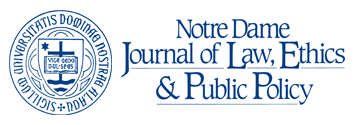Notre Dame Journal of Law, Ethics & Public Policy Online
Document Type
Article
Publication Date
2016
Abstract
The Model Rules of Professional Conduct require a lawyer, including defense counsel in a criminal proceeding who actually knows that her client has committed or intends to commit perjury, to take remedial measures, up to and including disclosure to the tribunal. This rule has justly caused considerable handwringing among academics, practitioners, and clients. The present Essay begins with the simple observation that a lawyer’s determination that her client is, or intends to be, perjurious is a legally consequential finding of fact. It proceeds to argue that, like all other findings of fact bearing on the legal rights and duties of the client, the determination that the client is, or intends to be, perjurious should be subjected to carefully calibrated procedural protections. These protections would, as they do in other settings, attempt to insulate the fact-finder—here, the lawyer— from prejudicial information and possible implicit biases. The Essay then concludes that the Model Rules should be interpreted to require the incredulous attorney to bear the burden of rebutting her client’s presumed honesty by proof not less than that beyond a reasonable doubt.
Recommended Citation
Fountain, Caleb J., "CLIENT PERJURY, IMPLICIT BIAS, AND THE PROBLEM OF ACTUAL KNOWLEDGE" (2016). Notre Dame Journal of Law, Ethics & Public Policy Online. 4.
https://scholarship.law.nd.edu/ndjlepp_online/4

